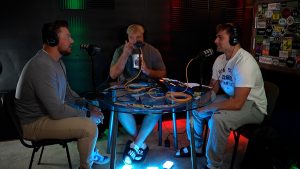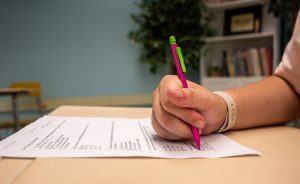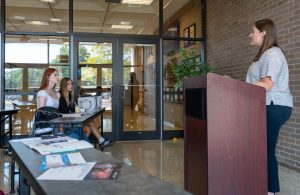Out of Focus
Is the District Firewall Shoot-and-Scoot Effective?
December 17, 2017
All too often have you clicked on a website that you needed for a research paper, or tried to listen to some tunes as you grind your way through Calculus homework, and been greeted by this message: “Page Blocked. Access to the requested site has been restricted due to its contents.”
Really? What makes a site worthy of being blocked? Are students really benefiting from this Internet safety net? Does this protocol need changing? Allow me to dissect the situation.
With the rise of the Internet came immense access to the world and all its wonders; of course, that is not always a good thing. Anyone who knows how to download Torr and use a basic search engine can access the dark web and the deadly secrets that lie in its coding.
That being said, even the very surface of the Internet has encrypted websites, pornographic web pages, and viruses galore that could wreak havoc on an unsuspecting student’s laptop. However, here at the U of NA, the goal of website censorship seems to be less focused on protecting students from these harmful websites and more concentrated on blocking what can seem to be every site that is not Kahoot!, Quizlet, or a major news site like CNN or The Washington Post. In some instances, even those essential sites are deemed unsafe, as I recall an article being blocked for containing the word “sex” (describing gender, not the act).
The method of site censorship that is currently in place appears to be random and uncalculated. After all, why else would the Monte Cello’s and Baierl Honda main websites be blocked? Perhaps the fact that Pizza Hut is fully accessible suggests that Monte Cello’s pizza is inferior and we are interested in a change of sponsor? If this is not the case, then it is quite confusing why two of our biggest sponsors continue to fund NA programs if Administration deems them inappropriate or otherwise worthy of censorship.
The bigger question, however, is whether this benefits students.
According to numerous students and staff, the blocked sites initiative is, in fact, a major hindrance to learning, instruction, and interaction. As one NASH teacher told me, “I have actually stopped doing some online activities because I was tired of fighting the blocked websites. They [the district] want us to be in the 21st Century and use technology, yet they put us in handcuffs and prevent us from doing those things.”
Such remarks raise a very good question: does the extent to which sites are blocked at NA go against Focus 2020?
The Focus 2020 initiative was implemented with the goal to “innovate [North Allegheny’s] educational practices and become leaders in technology integration.” This was meant to, in turn, reinforce the overarching mission of North Allegheny to “prepare all students for success in a changing world.”
Yet with the issue of laptops for high schoolers and iPads for middle schoolers came a huge sigh from the student body — the opposite response Administration was expecting. Why the distress? Because students knew from the very beginning that they would run into the obstacles of any Administration-sanctioned program.
Of course, that is not to say that Administration is always in the wrong — far from it, in fact. The student body understands that it is their job to guide and protect us through our educational experience, which often involves making difficult decisions.
However, the current blocked sites tactic is a mistake.
As I mentioned before, the algorithm is clearly flawed. There are certainly some very inappropriate websites that are rightfully blocked, such as pornographic websites and social media platforms that have a reputation for being on the shady side, like Reddit and Tumblr. But there are some clear gaps in Administration’s security against inappropriate websites.
For example, until last year, the official website of the Knights of the KuKluxKlan was unblocked on school laptops. Even now, websites such as Vapor Beast, The Pirate Bay, Electronic Tobacconist, the Cabela’s Firearms store, and many other sites Administration is openly against are fully accessible to the student body. Instead, students are not able to access most major social media platforms or file sharing services such as SoundCloud, Spotify, Youtube, Loudwire, Rolling Stone Magazine.
What makes these sites offensive or inappropriate for students? What are the criteria for blocking a site? If these are all truly deemed unsafe or inappropriate, why are websites like Pinterest and Cool Math Games not blocked? This is the flaw in the blocking algorithm.
Administration does have a responsibility to uphold a high standard of education, and part of this entails leading students in the right directions in terms of what we search, post, etc. However, the current initiative is doing much more harm than good. For instance, SoundCloud and YouTube are crucial for access to educational videos as well as school-sponsored projects, such as NATV and Uproar media.
Yes, there is just too much gray area on the Internet, and it is the responsibility of the District to make sure students are safe and focused. Nonetheless, Administration is overlooking a major aspect of their mission as part of Focus 2020: this is a changing world, and we need to be ready for it. It is clearly written on the North Allegheny webpage that the goal of an NA education is to prepare students for the ever-changing world we live in. Blocking every website that has the slightest bit of profanity or non-academic content is not putting that goal into action. It is a hindrance to the student body to be so sheltered, especially if the majority of students are just trying to access school-related material or simple, harmless content on our laptops.
I find it extremely troubling that I can readily buy a gun or vape on a district-issued laptop, and yet I can’t access a SoundCloud podcast that I produced in conjunction with NATV. I can freely waltz onto the Pirate Bay, but I can’t read an issue of Rolling Stone online. This blocked sites initiative is blatantly flawed and frankly needs to be changed. Students need a more open Internet for research projects, the involvement of NA media activities, and an overall increase in student productivity and school-life balance. In this changing world, NA cannot shelter students forever; eventually, we will have to take responsibility for our actions on the Internet and reap the benefits or consequences.
Why can’t our Internet policy be similar to every other behavioral policy in the district? In every other area of student life, wrong behavior is punished. Online, however, the approach is preventative to the point of being counter-educational.
North Allegheny has done a fantastic job from the middle school level up in educating students on how to make good choices on social media and the Internet as a whole. These programs and assemblies should continue, as they are vital for student health and wellness in regard to our access to the worldwide web and all the baggage that comes with it. However, this blocked sites business is ineffective and a major hindrance to students and staff; it’s time for a rewrite of the code.













Justice Gobbel • Jan 11, 2018 at 8:57 am
I agree, especially with the teachers quote. It’s hard to make a lesson learned without using the technology we have at our hands. Any curse word we say is censored because it’s seen as “Un-Official” or “Inappropriate”. You can’t shield us from something that we already know of. Many of those words are just more aggressive ways of saying their lesser counterparts. NA needs to cut back on the restrictions. I understand the blocking of pornographic websites and sites that are inappropriate, but when you block a website that you or a student needs to learn more about a subject, it’s absolutely ridiculous. The Fender website isn’t blocked but the Fender custom shop website is blocked. The NA firewall is absolutely ridiculous and needs to be fixed or removed completely. These laptops are almost useless sometimes.
Ellen • Dec 19, 2017 at 1:29 pm
I remember at one point the north allegheny orchestra site was blocked on north allegheny laptops lol
Emily • Dec 19, 2017 at 8:39 pm
Something similar happened to me! I was trying to access the NA Musical website, but it was blocked because it had “entertainment content.”